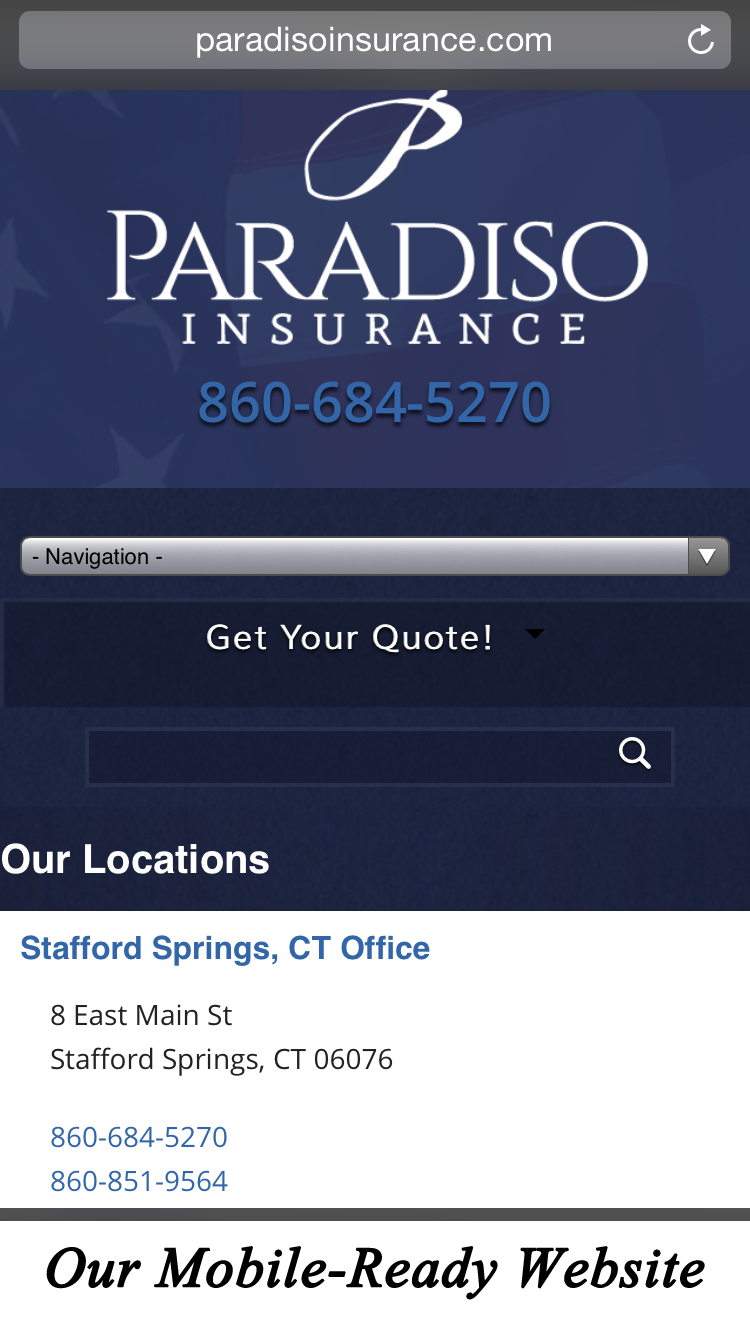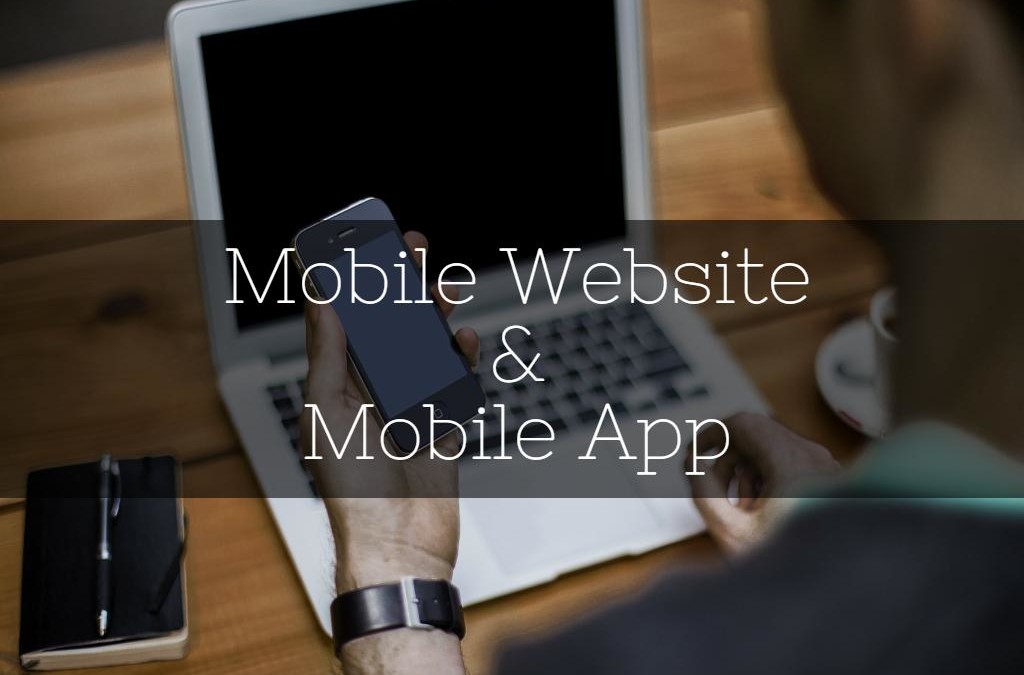Unless you’ve been living under a rock for the last few years, you’ve probably caught wind of the Mobile vs. Desktop marketing saga, relating to customers actually buying products online from a desktop, versus buying and searching for products from their smartphone.
When 4 out of 5 consumers shop on their smartphones and 40% or more of these customers/prospects will abandon a website if it is not mobile-friendly, it shows that this battle is in its final round. Google also weighed in earlier this year with the announcement that mobile-friendly sites would achieve a better ranking in search results (SEO) than websites that aren’t mobile ready. The question is, is your agency website mobile friendly (responsive)?
I’m not saying that websites that are exclusively built for desktops have completely bit the dust, but the odds are firmly in the pocket-sized opponent’s corner and by a wide margin. Mobile may have its eyes set firmly on the prize, but this leads us to think about our next battle.
The Battle of the Native App vs. Responsive Website
The first question is, do you understand the difference between the two? If not, then you can read up on it here. The second question is, which one should you choose? The ideal answer to this last question is both, because each strategy can be extremely beneficial in different ways if they are implemented correctly. Of course, this is not always a viable option for everyone, whether it be for financial reasons, or in terms of workload, in which case trying to cut corners could hinder what you set out to do in the first place.
This leads us to an unpopular answer, which is that it depends entirely on your agency’s mobile strategy, wants, and needs as a whole. So the very first question is this: do you have an understanding of what you and your agency wants to get out of its mobile marketing strategy?
Your Agency’s Reach
If attracting new customers is the main aim of your main marketing goal, a mobile friendly website may be the more attractive option for you and your agency. SEO opportunities and links will take potential customers/prospects directly to your agency’s site with relative ease, whereas the marketing you employ for an agency app may not be directly connected. The app will be mostly centered on directing customers to an app store where they could then choose to download your agency’s app, instead of directing them toward a website.
The app will be mostly centered on directing customers to an app store where they could then choose to download your agency’s app, instead of directing them toward a website.
A mobile responsive website is accessible by all mobile users including users on smartphones, iPads, and other tablets without the need to download anything. This is particularly important for agencies looking to grow. On the flip side, by having an agency app, you can and will be able to give your customers and clients a 24/7 service, which will also help your agency grow and save you money long term.
If your mobile site is nothing more than a link with instructions to download an app, this could be a major turn off to prospects who have not heard of your agency before. Think about it, installing an app is a commitment, and users need a good amount of knowledge and/or a very good reason to give up that storage space on their mobile device.
With apps taking a whopping 80% or more chunk of our overall mobile usage (including social media networks and games alone, which account for around 50%), it can be argued that a web search will deliver richer results and information than an app store search could. But, this is still an opinionated debate, and you will find that people argue both sides of this battle.
Building Loyalty in your Agency
If developing and maintaining a loyal base of existing customers is your number one priority, the native app is a great choice for you to embrace. Our agency uses an app specialized for the insurance industry called Go Insurance Agent, which has helped us with customer loyalty and overall customer experience. The consumer has to make the choice to adopt your agency app, and is therefore already engaged with your message and or your agency’s brand. This makes them much more open to your marketing communication and gives you more up-selling opportunities.
and maintaining a loyal base of existing customers is your number one priority, the native app is a great choice for you to embrace. Our agency uses an app specialized for the insurance industry called Go Insurance Agent, which has helped us with customer loyalty and overall customer experience. The consumer has to make the choice to adopt your agency app, and is therefore already engaged with your message and or your agency’s brand. This makes them much more open to your marketing communication and gives you more up-selling opportunities.
Some benefits of the app are that the app allows you to put your own agency’s brand and spin on the interface. Also, perhaps you have a particularly attractive or convenient feature that is only accessible through your app. It could also be argued that some app strategies succeed more for the larger, more well-known brands, because consumers will know what to expect. That being said, I personally feel that an agency app is not just for well-known brands, but also for the agency owner who is serious about giving a great customer experience. Yes, your agency not only needs an app, but you also need to implement a strategy to get as many of
your clients to download the app and use it!
However, if you and your agency decide to get an agency app after reading this article, please remember that your decision is only half the battle. The next thing your agency has to do is make sure your app doesn’t lay dormant amongst all of the other forgotten digital toys. An app that doesn’t get used won’t do you or your agency any good.
One of the most exciting features of our agency app is the ability to send push notifications to everyone who has downloaded it, which is arguably much more direct and powerful than something like an e-mail marketing campaign that is delivered to prospects who filled out a form on your website. The user does not have to go into their email app and open the message – it is shot directly to their home screen in a short burst which has a 99.9% visibility rate. That is very powerful to your agency’s marketing and brand.
Having the right agency app will also provide a lot of data on how customers are using your app, which is one of things that I love about the app that we use. I have a dashboard to track what my clients are doing with my app, and this type of data paves the way for creating personalized offers, and makes communication from your agency to your customers an easy and personable experience.
This is not to say that your agency website can’t collect data or personalize the consumer experience, but a downloaded app has less barriers to the user and requires less action for the agent. Having an app also allows your agency to be directly connected to each of your customers. I’ve recently read a report that over 50% of app users will opt-in for push notifications, so be sure your personalized push notifications are targeting the right half!
Your Customers User Experience
Again, the native app is built for champions. I’m a huge supporter of both sides of the spectrum, but from the native app user’s point of view, it really is convenient due to the fact that rather than being built to adapt to the mobile operating system, it is created specifically for it. This provides numerous advantages for the consumer/customer’s user experience. The native app does not have to rely on third party apps to be accessed. This eliminates the worry of having slow-loading pages brought on by out-of-date browsers that are struggling to process a wealth of information.
The big deal with the user experience ring, however, is the fact that the native app can integrate mobile assets and links to other native apps, which is something a mobile-friendly website simply cannot do. Each individual user can allow the app to access things such as their camera, insurance cards, picture of claims, their location, and social media apps, which paves the way for your team be really creative with the special features you develop and implement.
While the ability to utilize mobile assets is attractive, it’s important to keep in mind how useful this would be to your agency, because your social media marketing can benefit hugely from these capabilities and we can give our customers a great experience in the process.
Maintenance
Development and maintenance are key considerations when you enter any sort of technical project for your agency, and that very much so applies to choosing between a native app and a mobile optimized website. I’m not asking you to choose one or the other, I’m asking you to accept both with open arms, because your agency can’t afford to have one without the other.
Upgrading your website to a mobile responsive design is likely to cost significantly less in most cases, or even nothing at all. Buying an agency app will cost you more, but it won’t be a lot of money and if you go to the carrier you write the most amount of business with, they probably will pay for it for you.
Maintenance of an app will also be essential, and could prove costly if you develop an app for your own agency. There are already great apps made for us agents, and there is no real reason for us to do develop our own. I have gone down both roads and have settled in with one amazing app for my agency. I have no worries about maintenance other than a small set fee. If the platforms and devices that the app runs on undergo significant updates, you will likely have to update your app too in order for it to keep working correctly on the relevant devices but if you buy it from a respectable app company you will not have to worry about any of this. Maintenance of responsive websites, though still requiring a technical team, would be much simpler and cheaper.
Purchases
Though there are a wealth of other considerations, recent research suggests that consumers favor mobile websites over native apps when making purchases. Regardless, let’s think of an app for your agency as a communication tool, because it’s where a client can communicate with you with one touch of a button.
This may be surprising for some, however when we consider that smartphone users dedicate only 5% of their overall usage to shopping (think beyond shopping), it starts to make a little more sense. Device memory space is precious, and if an app is not being used regularly, then it may get deleted.
The only definitive answer here is that you need to have a mobile medium, or you risk losing out. A responsive website is the best place to start, and particularly valuable in the insurance industry, where consumers are notorious for shopping around and less able to justify the permanence of an app.
It’s true that a mobile app can help to bring back existing customers and is more exciting on a superficial level, but it also requires considerably more resources and creativity. Optimizing your website for mobile is more cost-effective, and an app is a risky investment if you are just getting started in the mobile arena. So don’t go out and try develop your own agency app, look for companies like Go Insurance Agent and then make the purchase.
The native app may be the new kid on the block but the responsive website is by no means out for the count – ensure your agency’s website is optimized first and foremost, then get out there and find the right app that fits your agency.






Informative and nice comparison. I think it would be helpful for everyone, who would like to be mobile friendly. So, try to add this one to the wiki page about mob.web or development: http://getsmall.link/9f7e5de1